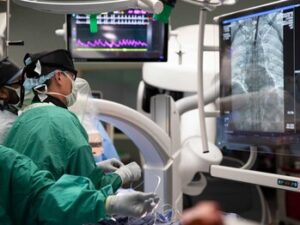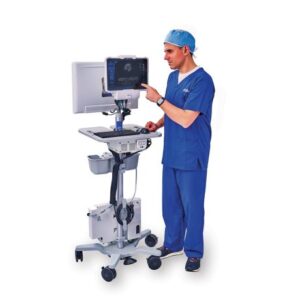
In a pioneering surgery, a 32-year-old woman from Nepal was successfully treated for a giant mesenteric tumour by a laparoscopic surgery at the CK Birla Hospital®, Delhi. The patient came to the hospital with complaints of extreme pain and an over-sized stomach. Upon further evaluation, it was diagnosed she had a giant 4kg and 40cms long tumour in her stomach.
Furthering the commitment to strengthening delivery of global standards of clinical excellence, the CK Birla Hospital®, Delhi successfully conducted a rare laparoscopic surgery to remove the giant tumour. The team of doctors at CK Birla Hospital®, Delhi led by Dr Amit Javed, Department of Advanced Surgical Sciences and Oncology Surgeries removed the tumour while preserving the intestine. The surgery was performed by a keyhole laparoscopy technique and the 4kg tumour was extracted via a pfannenstiel incision, usually made during a caesarean section for delivery of the baby. This procedure resulted in no scarring on the abdomen and ensured minimal pain.
Dr Amit Javed said, “It was a very complex surgery because of the large size of the tumour, which occupied the abdominal cavity, giving us very little space in the abdomen to perform the laparoscopic surgery. In addition, the tumour was very large and heavy which made it difficult to handle & perform the dissection laparoscopically. The delivery of the specimen was like delivering a large size baby as in a caesarean section. The patient has now fully recovered and is leading a normal life. “
I was quite worried when I got to know about my condition. Top hospitals in Kathmandu and even in Delhi were not ready to go-ahead with the surgery due to the size of the tumour. I was very concerned about quick recovery & cosmesis and wanted to have a laparoscopic surgery. When I met Dr. Amit Javed at CK Birla Hospital®, he assured me that the tumour can be removed with minimal scars and pain, which made me confident to undergo laparoscopic surgery, said the patient.
Mesenteric tumours are rare and consist of a heterogeneous group of lesions. Masses may arise from any of the mesenteric components, like peritoneum, lymphatic tissue, fat, and connective tissue. Cellular proliferation can also arise from infectious or inflammatory processes. They can be classified as solid or cystic, benign, or malignant. Mesenteric tumours are usually discovered incidentally or during investigation of non-specific symptoms. Therapeutic management options vary widely depending on the nature of the lesion; they range from simple observation or medical therapy to surgery.
Speaking on the occasion, Mr Akshat Seth, Chief Executive Officer, CK Birla Healthcare said, “We are committed to providing global standards of healthcare by using advanced medical innovations and techniques like minimally invasive laparoscopic surgeries for our patients. This case, like many others, is a testimony to our long-standing track record of delivering world-class healthcare.”
“Our hospital at Delhi aims to take forward patient-centric and clinically reliable care that we stand for. This successful outcome is a reaffirmation of our clinical excellence through a case that is rare not only in India but worldwide as well,’’ said Mr. Vipul Jain, Chief Business Officer, CK Birla Hospital








